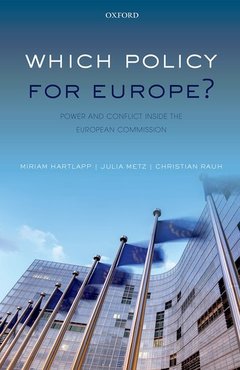Which Policy for Europe? Power and Conflict inside the European Commission
Langue : Anglais
Auteurs : Hartlapp Miriam, Metz Julia, Rauh Christian

The European Commission is at the center of the European Union's political system. Within its five-year terms each Commission proposes up to 2000 binding legal acts and therefore crucially shapes EU policy, which in turn impacts on the daily lives of more than 500 million European citizens. However, despite the Commissions key role in setting the agenda for European decision making, little is known about its internal dynamics when preparing legislation. This book provides a problem-driven, theoretically-founded, and empirically rich treatment of the so far still understudied process of position-formation inside the European Commission. It reveals that various internal political positions prevail and that the role of power and conflict inside the European Commission is essential to understanding its policy proposals. Opening the 'black box' of the Commission, the book identifies three ideal types of internal position-formation. The Commission is motivated by technocratic problem-solving, by competence-seeking utility maximization or ideologically-motivated policyseeking. Specifying conditions that favor one logic over the others, the typology furthers understanding of how the EU system functions and provides novel explanations of EU policies with substantial societal implications.
Prof. Dr. Miriam Hartlapp is Professor for Governance and Organizational Studies at the University of Bremen. She was doctoral and postdoctoral researcher at the Max Planck Institute for the Study of Societies in Cologne, worked at the ILO, Geneva, and led a Young Independent Research Group at the WZB Berlin Social Science Center. She is co-author of "Complying with Europe: The Impact of EU Minimum Harmonisation and Soft Law in the Member States" (CUP 2005) that won the EUSA Best Book in EU Studies Prize 2007 and has published widely on the EU political system, questions of compliance and enforcement, governance in multilevel systems, as well as on international, European and comparative economic, employment and social policies. Dr. Julia Metz is senior researcher in the research area "Governance and Organizational Studies" at the University of Bremen. Previously she has worked at the WZB Berlin Social Science Center, where she is guest researcher now. She holds a Masters in political science and economics from the University of Heidelberg and a PhD from the Free University Berlin. Her research interests include the dynamics of European administrative governance, the nexus of expertise and politics in the policy process, and research and innovation policy and her work has appeared in the Journal of European Integration and Policy and Society, among others. Dr. Christian Rauh is a research fellow in the Global Governance department of the WZB Berlin Social Science Center. He received his M.A. in Politics and Management from the University of Konstanz and his PhD from the Free University Berlin. His dissertation on "Politicisation, issue salience, and the consumer policies of the European Commission " was awarded with the 2013 ECPR Jean Blondel Prize for the best thesis in politics. His work covers political economy and supranational governance and has appeared in the European Journal of Government and Economics, West European Politics, the Journal of European Integr
Date de parution : 09-2014
Ouvrage de 360 p.
14.6x27.3 cm
Thèmes de Which Policy for Europe? :
© 2024 LAVOISIER S.A.S.



